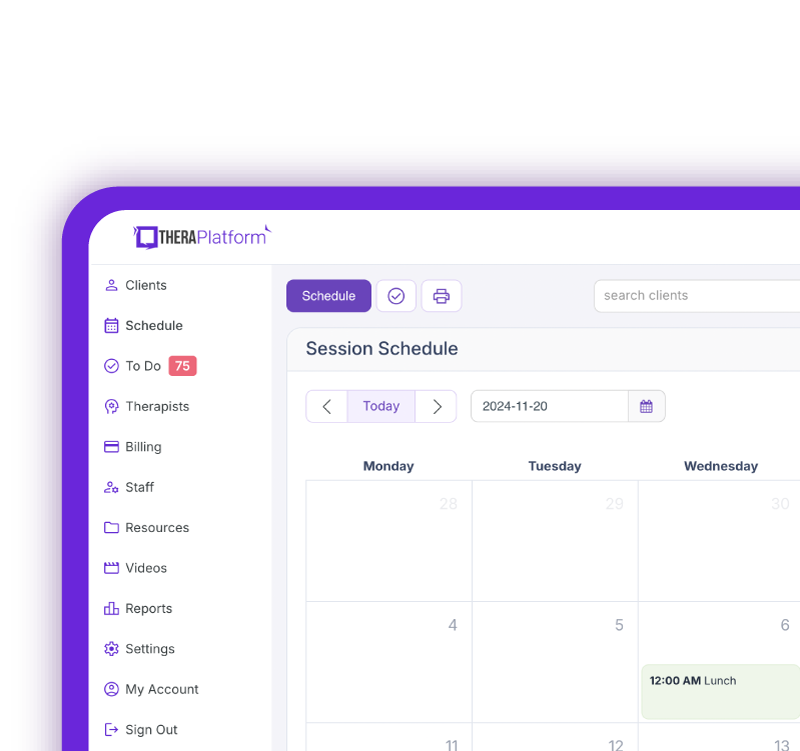Medicare payer ID

Medicare Payer ID navigation can be challenging for therapists. To bill Medicare efficiently and accurately, therapists must understand several crucial components.
Summary
- Medicare Payer IDs are essential billing codes that ensure claims are routed correctly and processed efficiently; using the wrong ID can result in delays or denials.
- Therapists can find the correct Payer ID through the Medicare website, clearinghouses, EHRs integrated with clearinghouses like TheraPlatform, and provider portals managed by Medicare Administrative Contractors (MACs). Enrolling in an insurance billing course for therapists can help providers enhance their knowledge on some of these processes.
- Best practices include maintaining an up-to-date list of Payer IDs, verifying them regularly, submitting claims electronically, and training billing staff on correct usage.
- Challenges include regional variations, frequent changes, and the complexity of Medicare plans, making it important for providers to stay informed and organized.
→ Click here to enroll in our free on-demand Insurance Billing for Therapists video course [Enroll Now]
The Medicare Payer ID is a billing code that plays a pivotal role in ensuring claims are processed correctly. Using the correct Medicare Payer ID helps facilitate a smooth billing process, including timely reimbursement.
Let's examine what a Medicare Payer ID is, how to find it, its importance, best practices, and more need-to-know details.
What is Medicare Payer ID?
A Medicare Payer ID is a unique identifier assigned by Medicare to process and track claims submitted by healthcare providers. This code directs the claim so it can be processed by the appropriate specialized or regional Medicare entity.
When submitting a claim for reimbursement, healthcare providers must include the correct Payer ID. Medicare will then recognize and categorize the claim.
The claim will likely be delayed or rejected if a therapist uses an incorrect Payer ID. Healthcare providers can help ensure timely reimbursement of services by using the correct Medicare Payer ID when billing.
Streamline your insurance billing with One EHR
- Claim batching
- Auto claims
- Automated EOB & ERA
- Real-time claim validation
- Real-time claim tracking
- Aging and other reports

How to find the correct Medicare payer ID
Therapists and other healthcare providers can locate the correct Medicare Payer ID through several reliable sources.
- Medicare Website: The official Medicare website is a primary source of up-to-date information. The Centers for Medicare & Medicaid Services (CMS) also offers several interactive tools on its website. Providers can locate contact details and payer-specific information.
- Clearinghouses. A clearinghouse serves as a link between healthcare providers and payers such as Medicare. TheraPlatform offers an integrated clearinghouse that maintains a database of Payer IDs. This tool identifies the correct Payer ID based on the provider's location and the type of service provided.
- Provider portals. Medicare Administrative Contractors (MACs) often offer online provider portals that can be used to access payer IDs, as well as other claim submission tools and billing guidelines.
Watch this video to see how TheraPlatform’s EHR saves time on insurance billing
Importance of using the correct Medicare Payer ID
Using the correct Payer ID is a critical step in the billing process.
Here's why:
- Avoiding claim denials. Using the incorrect Payer ID can result in a claim denial, leading to frustration, additional work, and resubmission.
- Preventing payment delays. If the claim is not denied, delays in processing are likely to occur if a provider uses the incorrect Payer ID. The claim may have been incorrectly routed, and additional time would be needed for it to be rerouted to the correct Payer ID.
- Maintaining compliance. Accurate billing requires using the correct Payer ID, which is essential for providers to maintain compliance with Medicare regulations.
- Streamlining the billing process. Accurate billing and the appropriate Payer ID simplify the billing process and reduce potential errors. Therapists and other healthcare providers can focus more on patient care and less on paperwork and addressing errors.
Common Medicare Payer IDs for different states/regions
Medicare Payer IDs may vary according to the region and type of Medicare plan.
While it is recommended to verify with your specific MAC, here are a few common Medicare Payer IDs:
- National Medicare claims: The general payer ID for National Medicare is 12399. This code is used to submit standard Medicare claims to the national Medicare system.
- Medicare Administrative Contractors (MACs): Medicare is divided into specific regions according to the jurisdiction of Medicare Administrative Contractors (MACs). For example, Jurisdiction 1 (J1) - Noridian Healthcare Solutions (West) covers states such as California, Nevada, Oregon, and others. The Payer ID is 47706 for this jurisdiction.
- Medicare Part A & B: The CMS Payer ID for these electronic claims is 80882.
Practice Management + EHR + Telehealth
Manage more in less time in your practice with TheraPlatform

Best practices for Medicare billing
To ensure Medicare billing is completed accurately and efficiently, healthcare providers can follow these recommended best practices:
- Maintain a Payer ID list: Providers can keep a current list of the Payer IDs for their region and any specialty MACs they work with. This list can be easily referenced when completing the billing process so Payer IDs can be efficiently identified and attached to claims.
- Stay up to date with Payer IDs: Medicare Payer IDs can change over time, so it's important to verify the codes regularly. When Medicare policies are updated, it is particularly crucial to verify Payer IDs. Providers can refer to Medicare Resources such as the official Medicare website, provider portals, and clearinghouse representatives to verify correct Payer IDs.
- Take advantage of clearinghouse resources: Clearinghouses can serve as valuable resources and can provide support for managing Payer IDs.
- Provide staff training and education: By participating in regular training and education, billing staff should remain knowledgeable about Medicare Payer IDs and the importance of using the correct codes.
- Submit claims electronically: Submit claims electronically through a claims submission system that offers built-in Payer ID verification. These systems, such as the claims submission tools offered by TheraPlatform, help streamline the billing process and ensure accuracy.
Challenges of using the Medicare Payer ID
The Medicare Payer ID is essential, but it can present some challenges that providers should be aware of.
- Regional variations. Payer IDs can vary across different regions, which may confuse providers. Some providers work with multiple Medicare plans or patients from various geographic areas.
- Frequent updates and changes. Medicare policies and Payer IDs can frequently change. Providers must regularly check their billing systems and update Payer IDs as needed to ensure the correct codes are being used.
- Complexity of Medicare plans. Medicare has multiple programs (Part A, Part B, Medicare Advantage, etc.), each with its own requirements. Identifying the correct Payer ID for each billing scenario can be difficult.
The Medicare Payer ID is a critical component of the billing process. Healthcare providers must ensure they use the correct Payer ID to complete accurate and timely claims processing. Using the correct Medicare Payer ID can help providers avoid claim denials, payment delays, and other administrative issues.
Following recommended best practices and utilizing resources such as the Medicare website, clearinghouses, and provider portals can help providers find the correct Payer ID.
Providers should stay current on Medicare changes and ensure they are using the most up-to-date Payer IDs. This can help providers streamline their billing process and maintain compliance.
How EHR and practice management software can save you time with insurance billing for therapists
EHRs with integrated billing software and clearing houses, such as TheraPlatform, offer therapists significant advantages in creating an efficient insurance billing process. The key is minimizing the amount of time dedicated to developing, sending, and tracking medical claims through features such as automation and batching.
What are automation and batching?
- Automation refers to setting up software to perform tasks with limited human interaction.
- Batching or performing administrative tasks in blocks of time at once allows you to perform a task from a single entry point with less clicking.
Which billing and medical claim tasks can be automated and batched through billing software?
- Invoices: Create multiple invoices for multiple clients with a click or two of a button or set up auto-invoice creation, and the software will automatically create invoices for you at the preferred time. You can even have the system automatically send invoices to your clients.
- Credit card processing: Charge multiple clients with a click of a button or set up auto credit card billing, and the billing software will automatically charge the card (easier than swiping!)
- Email payment reminders: Never manually send another reminder email for payment again, or skip this altogether by enabling auto credit card charges.
- Automated claim creation and submission: Batch multiple claims with one button click or turn auto claim creation and submission on.
- Live claim validation: The system reviews each claim to catch any human errors before submission, saving you time and reducing rejected claims.
- Automated payment posting: Streamline posting procedures for paid medical claims with ERA. When insurance offers ERA, all their payments will post automatically on TheraPlatform's EHR.
- Tracking: Track payment and profits, including aging invoices, overdue invoices, transactions, billed services, service providers.
Utilizing billing software integrated with an EHR and practice management software can make storing and sharing billing and insurance easy and save providers time when it comes to insurance billing for therapists.
Streamline your practice with One EHR
- Scheduling
- Flexible notes
- Template library
- Billing & payments
- Insurance claims
- Client portal
- Telehealth
- E-fax

Resources
TheraPlatform is an all-in-one EHR, practice management, and teletherapy software built for therapists to help them save time on admin tasks. It offers a 30-day risk-free trial with no credit card required and supports mental and behavioral health, SLPs, OTs, and PTs in group and solo practices.
More resources
- Therapy resources and worksheets
- Therapy private practice courses
- Ultimate teletherapy ebook
- The Ultimate Insurance Billing Guide for Therapists
- The Ultimate Guide to Starting a Private Therapy Practice
- Mental health credentialing
- Insurance billing 101
- Practice management tools
- Behavioral Health tools
Free video classes
- Free on-demand insurance billing for therapist course
- Free mini video lessons to enhance your private practice
- 9 Admin tasks to automate in your private practice
References
Burks, K., Shields, J., Evans, J., Plumley, J., Gerlach, J., & Flesher, S. (2022). A systematic review of outpatient billing practices. SAGE Open Medicine, 10, 20503121221099021. DOI: https://doi.org/10.1177/20503121221099021.
Derricks, J. (2021). Overview of the claims submission, medical billing, and revenue cycle management processes. In The Medical-Legal Aspects of Acute Care Medicine: A Resource for Clinicians, Administrators, and Risk Managers (pp. 251-276). Cham: Springer International Publishing. DOI: https://link.springer.com/chapter/10.1007/978-3-030-68570-6_11
Romans, B., Nguyen, E., Biddle, M., Paul, A., Rosko, Z., Minaei, A., ... & Robinson, R. F. (2022). Billing and coding: disparities in healthcare provider training. Journal of Allied Health, 51(1), 43-46. DOI: https://www.ingentaconnect.com/content/asahp/jah/2022/00000051/00000001/art00009
FAQs about Medicare Payer IDs
How can therapists find the correct Medicare Payer ID for their region or specialty?
Therapists can locate the correct Medicare Payer ID through the official Medicare website, their clearinghouse database, or provider portals managed by Medicare Administrative Contractors (MACs).
How often should providers verify Medicare Payer IDs?
Because Medicare policies and payer codes can change frequently, providers should verify Payer IDs at least quarterly or anytime there are major Medicare updates. Staying current helps avoid claim denials and ensures smoother billing.
What happens if a therapist uses the wrong Medicare Payer ID?
Using an incorrect Medicare Payer ID can lead to claim rejections or payment delays. Integrated billing tools like TheraPlatform help reduce these errors by validating claims and checking payer information before submission.



